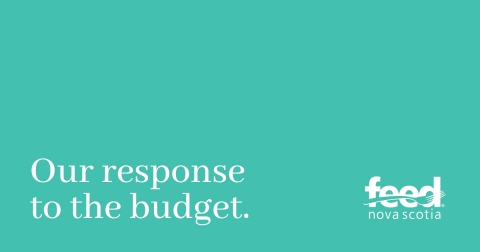Provincial budget: Our response

If the government got word that poverty is under control, we missed the memo.
The latest budget is another disproportionate response to a persistent crisis. Some elected officials were shocked recently when child poverty numbers decreased in all provinces but Nova Scotia (where they grew by 2%). While these stats likely came after budget development, they would’ve received no dramatic indication of turning tides when it comes to poverty at any point in the recent past.
In a province with the lowest minimum wage in Canada, growing housing, childcare, and food costs, a high percentage of precarious jobs, and a social assistance program that historically hasn’t kept pace with the cost of living, it’s naïve to expect anything other than grim news. We haven’t put in the work, so why would we expect promising results?
The budget announced funding for the introduction of a Standard Household Rate for income assistance recipients, which will mean people will get the maximum amount they’re eligible for, as well as a very modest increase to monthly payments. Government will also extend the child maintenance exemption to clients of Housing Nova Scotia and the Disability Support Program. This is part of the ongoing transformation to the ESIA program, where we were pleased to see the end of child maintenance claw backs, doubling of the poverty tax credit, and wage exemptions. The Department of Community Services has urged patience for the transformation process—a tough ask for Nova Scotians whose wait for change seems endless—and have promised there is still more work to be done.
The recent federal budget announced an intention to work with provinces toward the creation of a national school food program. Given Nova Scotia’s top billing when it comes to child poverty rates, even a small acknowledgement of a willingness to entertain the idea would’ve been a welcome indication that our province’s shameful status quo is weighing on our elected officials’ minds at all.
When we speak of the overall health of our province, poverty rates so infrequently factor in to the conversation. In listening to Minister Casey’s opening remarks, they didn’t rate at all. She listed off a number of indicators contributing to a positive outlook for our province—exports reaching an all-time high, more fulltime jobs, and high population levels to name a few. We know the budget is a time to tout wins, but repeatedly ignoring a problem that erodes this incomplete picture of our province’s health is irresponsible.
While it’s easy to point the finger at government for failing to measure up, in the end they are beholden to those voting them in and out of office. If they haven’t heard the cries for help, it’s on us to turn up the volume. We need to hold our politicians accountable to a measure of success that includes one of the most critical issues we face.
Because we will ignore poverty at our own peril. Thousands of Nova Scotians struggle to get through the day—skipping meals so their kids don’t have to, choosing medication over food, sleeping on the streets because the shelters are full. If you’re unmoved by a stranger in dire pain, there are very practical reasons to reduce poverty—it costs our province more than $2 billion a year. If our healthcare system is in crisis now, imagine the status quo in ten or twenty years.
It’s not enough to donate food and funds. While this critical community support fills the void left by the absence of any policy to produce long-term change, as a society, we should no longer accept that as just the way it is. It’s not right. And it’s not getting us anywhere.